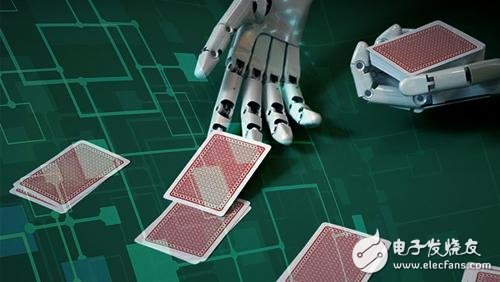After more than 20 days of fighting, the top four Texas Hold'em players were a bit lonely: they finally lost. This time, the "gambling god" that defeated them was the artificial intelligence "Libratus" developed by Carnegie Mellon University. After nearly 11 hours of competition every day, human players still ignore the exhaustion to discuss the strategy of the next day, but artificial intelligence seems to be able to guess their minds. Whenever they are ecstatic to discover the tactical loopholes in artificial intelligence, this vulnerability will be filled the next day. This time, a casino in Pittsburgh, USA, became the latest battleground for "Human-Machine Wars". "Libratus" played 12 thousand hands-on and one-off Texas Hold'em poker with four human players. The game lasted from January 11th to 30th. At the end, artificial intelligence led the human race with a total of about $1.77 million in chips. Earlier this year, the artificial intelligence "DeepStack" developed by researchers at the University of Alberta in Canada and two universities in the Czech Republic has for the first time beat human pros in one-on-one No-Limit Hold'em. In the past 20 years, chess, Chinese chess, scrabble, and go... People have witnessed the complexion of artificial intelligence step by step to capture the wisdom of human wisdom. However, it is playing chess and playing cards. Is artificial intelligence only playing? In fact, just as puzzle games are good for children, chess games are the means to help artificial intelligence "develop intelligence" rather than goals. Different games present different technical challenges for artificial intelligence. The "Alpha Go" that won twice in both hands is to cultivate the decision-making ability of artificial intelligence based on complex information. A Go game with about 10 170 decision points is the most common in all board games. It requires artificial intelligence with great computing power to make decisions by predicting the winning percentage of all future steps. Go is a "perfect information" game, the information is completely open, the player can see the pieces on the board and predict the possibility of falling. The cards in the hands of Texas Hold'em players are invisible to other players, so it is an "imperfect information" game that requires more sophisticated reasoning skills and is more challenging for artificial intelligence. In addition, in order to play Texas Hold'em, artificial intelligence has to understand some psychology. There is a classic strategy in Texas Hold'em - bluffing, which is still bluffing when holding a weak hand to scare off opponents. Is the opponent bluffing? When do you want to bluff and still not be seen? These all pose challenges for writing artificial intelligence programs. There is also a history of artificial intelligence in the "human-machine war" of Texas Hold'em. An earlier version of the artificial intelligence "Claudico" developed by Carnegie Mellon University lost to human players in the 2015 competition. Then, what is the success of "revenge" in the "Libratus" that has come back? In fact, the name "Libratus" implies the secret of its victory. The meaning of this Latin word is "equilibrium", which represents the equilibrium game used by the program. The protagonist of the Oscar-winning film "Beautiful Mind", John Nash, proposed the "Nash Equilibrium" theory in the 1950s, also known as the non-cooperative game equilibrium, ensuring that each participant's strategy at the same time is a strategy for other participants. Optimal response. Texas Hold'em is an "imperfect information" game. It is impossible to calculate all the next possibilities according to Go, and the researchers will improve the artificial intelligence algorithm, let it apply the equilibrium game, and balance the risks and benefits to decide the next step. To achieve the perfect state in the Nash equilibrium definition. In addition, researchers have upgraded the computing power of artificial intelligence. And machine learning technology is still the key to the rapid progress of artificial intelligence in recent years. Developers say they don't teach "Libratus" how to play poker, just telling it the rules of poker and letting it find a winning strategy through trillions of self-defense. On each night of the game day, developers will also improve their algorithms with Pittsburgh's supercomputers, which is why it always takes a step before human opponents check and balance themselves. In addition to winning the wind at the poker table, artificial intelligence that masters game theory can also be useful in real life, such as financial transactions, auctions, political and commercial negotiations, military or cybersecurity strategies, and planning medical programs. In the future, artificial intelligence may give an optimal solution when it is necessary to make strategic decisions based on “imperfect informationâ€. Solar power system JIANGSU BEST ENERGY CO.,LTD , https://www.bestsolar-group.com